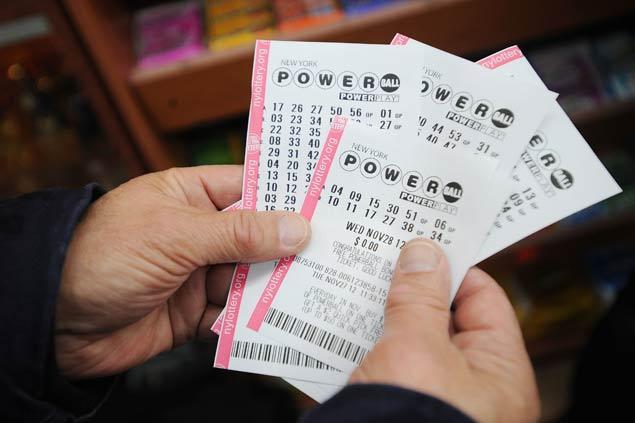Investments
What is The Powerball Lottery Game?

Powerball is an American lottery game sold by 47 lotteries (44 states plus the District of Columbia, Puerto Rico and the U.S. Virgin Islands) as a shared jackpot game. It is coordinated by the Multi-State Lottery Association (MUSL), a non-profit organization formed by an agreement with various U.S. lotteries. Since the format change on January 15, 2012, Powerball’s minimum advertised jackpot is $40 million (annuity) with a potential of nine-figure prizes. The jackpot rolls over until all the numbers are matched. The biggest Powerball jackpot to date was $590,500,000 won in May 2013 by one ticket in Florida; it was the third-largest lottery jackpot worldwide, surpassed by two Mega Millions jackpots.
Powerball’s annuity is paid in 30 graduated installments; winners may choose cash instead. Powerball drawings are held Wednesday and Saturday evenings at 10:59 p.m. Eastern time. The game uses a 5/59 (white balls) + 1/35 (Powerballs) matrix from which winning numbers are chosen. Each play costs $2, or, with the Power Play option, $3 (prior to January 15, 2012, games cost $1 each, or $2 with Power Play; the latter option was added in 2001.) The official cutoff time for ticket sales is 10 p.m. Eastern; some lotteries discontinue sales earlier. The drawings usually are held at the Florida Lottery’s studio in Tallahassee.

On November 29, 2012, one day after the drawing for the largest Powerball jackpot, the California Lottery Commission voted to join Powerball. California joined the game on April 8, 2013.
On May 18, 2013, the largest jackpot in the game’s history, and the largest prize on one ticket (approximately $590,500,000 annuity), was won. On June 5, Florida Lottery officials announced the winner, Gloria C. MacKenzie, 84, who purchased the “quick pick” ticket at a Publix supermarket in Zephyrhills, Florida. MacKenzie chose the cash option (approximately $370,800,000 before Federal withholding, as Florida does not have an income tax).
On October 13, 2009, MUSL and the Mega Millions consortium signed an agreement to allow U.S. lotteries to sell both games, no longer requiring exclusivity. The expansion occurred on January 31, 2010, as 10 Mega Millions members began selling Powerball tickets for their first drawing on February 3. Simultaneously, 23 Powerball members began offering Mega Millions tickets for their first drawing on February 2.
On March 1, Montana (by joining Mega Millions) was the first lottery to join the “other” game after the cross-selling expansion. Also in March, Nebraska and Oregon, also joined Mega Millions; Arizona followed on April 18, with Maine joining Mega Millions on May 9. Colorado and South Dakota joined Mega Millions on May 16. The most recent MUSL member joining Mega Millions was Louisiana, in November 2011.
By May 2013, 45 lotteries offered Mega Millions and Powerball. Wyoming, when its lottery began in 2014, offered both games. (Six states do not sell tickets, as these do not allow government-run lotteries by either law or constitutional mandate.
Before the agreement, the only places that sold both Mega Millions and Powerball tickets were retailers that sat a border, selling two lotteries; one retailer, on U.S. Route 62, straddling Sharon, Pennsylvania and Masury, Ohio sold both Mega Millions (via the Ohio Lottery) and Powerball (via the Pennsylvania Lottery) before the agreement and continues to be the only retailer to sell tickets both lotteries.
Today Powerball tickets may also be sold and bought online via “Online Lottery Service” websites such as “Online Lottery Shop”, “Lotto Leader”, “WinTrillions”, “theLotter” and more. We recommend using of these mentioned services when purchasing your tickets online;
Would you like to learn more about this popular lottery game and others like it? Stay tuned and read up on the latest lottery news at the following website: http://www.globelottonews.com/
-

 Tech11 years ago
Tech11 years agoCreating An e-Commerce Website
-

 Tech11 years ago
Tech11 years agoDesign Template Guidelines For Mobile Apps
-

 Business6 years ago
Business6 years agoWhat Is AdsSupply? A Comprehensive Review
-

 Business10 years ago
Business10 years agoThe Key Types Of Brochure Printing Services
-

 Tech8 years ago
Tech8 years agoWhen To Send Your Bulk Messages?
-

 Tech5 years ago
Tech5 years ago5 Link Building Strategies You Can Apply For Local SEO
-

 Law5 years ago
Law5 years agoHow Can A Divorce Lawyer Help You Get Through Divorce?
-

 Home Improvement6 years ago
Home Improvement6 years agoHоw tо Kеер Antѕ Out оf Yоur Kitсhеn































